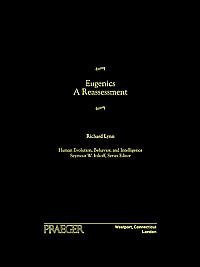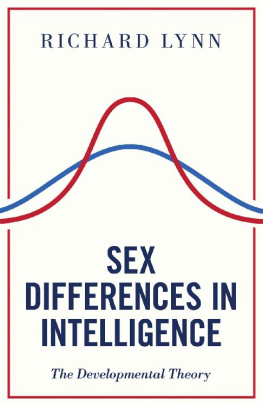Cover

| title | : | Eugenics : A Reassessment Human Evolution, Behavior, and Intelligence, 1063-2158 |
| author | : | Lynn, Richard. |
| publisher | : | Greenwood Publishing Group |
| isbn10 | asin | : | 0275958221 |
| print isbn13 | : | 9780275958220 |
| ebook isbn13 | : | 9780313000638 |
| language | : | English |
| subject | Eugenics, Eugenics, Genetic Techniques, Reproductive Techniques. |
| publication date | : | 2001 |
| lcc | : | HQ751.L9 2001eb |
| ddc | : | 363.9/2 |
| subject | : | Eugenics, Eugenics, Genetic Techniques, Reproductive Techniques. |
Page i
Eugenics
Page ii
Recent Titles in Human Evolution, Behavior, and Intelligence
The Evolution of Love
Ada Lampert
The G Factor: The Science of Mental Ability
Arthur R. Jensen
Sex Linkage of Intelligence: The X-Factor
Robert Lehrke
Separation and Its Discontents: Toward an Evolutionary Theory of Anti-Semitism
Kevin MacDonald
The Biological Origins of Art
Nancy E. Aiken
The Culture of Critique: An Evolutionary Analysis of Jewish Involvement in Twentieth-Century Intellectual and Political Movements
Kevin MacDonald
Relating in Psychotherapy: The Application of a New Theory
John Birtchnell
The Evolution of the Psyche
D. H. Rosen and M. C. Luebbert, editors
Mind and Variability: Mental Darwinism, Memory, and Self
Patrick McNamara
The Darwinian Heritage and Sociobiology
Johan M.G. van der Dennen, David Smillie, and Daniel R. Wilson
The Culture of Sexism
Ignacio L. Gtz
Evolution as Natural History: A Philosophical Analysis
Wim J. van der Steen
Page iii
Eugenics A Reassessment
Richard Lynn
Human Evolution, Behavior, and Intelligence Seymour W. Itzkoff, Series Editor

Page iv
Library of Congress Cataloging-in-Publication Data
Lynn, Richard.
Eugenics : a reassessment / Richard Lynn.
p. cm.(Human evolution, behavior, and intelligence, ISSN 1063-2158)
Includes bibliographical references and index.
ISBN 0-275-95822-1 (alk. paper)
1. Eugenics. I. Title. II. Series.
HQ751 .L9 2001
363.9'2dc21 00-052459
British Library Cataloguing in Publication Data is available.
Copyright 2001 by Richard Lynn
All rights reserved. No portion of this book may be
reproduced, by any process or technique, without the
express written consent of the publisher.
Library of Congress Catalog Card Number: 00-052459
ISBN: 0-275-95822-1
ISSN: 1063-2158
First published in 2001
Praeger Publishers, 88 Post Road West, Westport, CT 06881
An imprint of Greenwood Publishing Group, Inc.
www.praeger.com
Printed in the United States of America

The paper used in this book complies with the
Permanent Paper Standard issued by the National
Information Standards Organization (Z39.48-1984).
10 9 8 7 6 5 4 3 2 1
Page v
Contents
Preface: The General Theory of Eugenics | vii |
Part I.
Historical Introduction |
| Sir Francis Galton Lays the Foundations of Eugenics | |
| The Rise and Fall of Eugenics | |
Part II.
The Objectives of Eugenics |
| Historical Formulations | |
| Genetic Diseases and Disorders | |
| Mental Illness | |
| Intelligence | |
| Mental Retardation | |
| Personality | |
| Psychopathic Personality | |
Part III.
The Implementation of Classical Eugenics |
| The Genetic Foundations of Eugenics | |
| The Genetic Principles of Selection | |
| Negative Eugenics: Provision of Information and Services | |
| Negative Eugenics: Incentives, Coercion, and Compulsion | |
| Licenses for Parenthood | |
| Positive Eugenics | |
| The Ethical Principles of Classical Eugenics | |
Page vi
Part IV.
The New Eugenics |
| Developments in Human Biotechnology | |
| Ethical Issues in Human Biotechnology | |
| The Future of Eugenics in Democratic Societies | |
| The Future of Eugenics in Authoritarian States | |
| The Evolution of the Eugenic World State | |
References | |
Index | |
Page vii
Preface: The General Theory of Eugenics
During the course of the twentieth century a profound change took place in scientific and public attitudes to eugenics. In the first half of the century, virtually all biological scientists and most social scientists supported eugenics, and so also did many of the informed public. In the second half of the century, support for eugenics declined; and in the last three decades of the century, eugenics became almost universally rejected. In the history of science there is nothing particularly unusual in the rejection of a scientific theory. This has happened frequently as theories have come to be seen as incorrect and have been discarded. What is unusual is the rejection of a theory that is essentially correct. It is my objective in this book to establish that this is what occurred in the twentieth century with regard to eugenics.
There is such widespread lack of understanding about what eugenics is that it will be useful to begin with a summary statement of what can be called the general theory of eugenics. This consists of eight core propositions. These are:
| Certain human qualities are valuable. The most important of these are health, intelligence, and what was described by eugenicists as moral character, which consists of a well-developed moral sense, self-discipline, strong work motivation, and social concern. |
Next page












